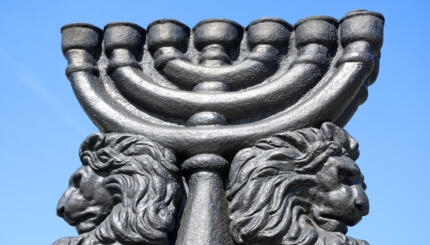Commentary on Parashat Vayera, Genesis 18:1-22:24
Parshat Vayera begins:
God appeared to him (Abraham) in the groves of Mamrei, and he was sitting at the door of the tent in the heat of the day. He lifted his eyes and saw, and behold three men were standing near him. He saw them, and ran from the door of the tent to greet them, and he bowed down to the earth. He said, “My master if I have found favor in your eyes please do not bypass your servant.” “Let a bit of water be brought and wash your feet, Rest yourselves under the tree. (Bereshit (Genesis) Chapter 18, verses 1-4)
Your Torah Navigator
1. When God appears to someone in the Bible, it is always to convey a message. Here we find that God came just to “visit” Abraham. Why? Appreciate the fact that this is the only place in the entire Bible in which God “visits” someone.
2. Why does the Bible go into such detail in describing where this meeting took place?
3. Why is Abraham sitting outside, on a scorching hot day, three days after his circumcision? Why are people walking from Damascus to Alexandria on such a hot day?
With your help, My Jewish Learning can provide endless opportunities for learning, connection and discovery.
4. Who is Abraham addressing when he says, “My Master, if I have found favor in Your eyes, please do not bypass your servant.” Is he speaking to God or to the visitors?
5. Abraham seems to have a very strange way of showing hospitality; first, he gives the visitors water to wash their feet and only then does he offer them a drink. Second, he seats them outside, near the tree while he goes inside to his cool, shaded tent! How can we explain this?
Your Midrash Navigator
“In the plains of Mamrei”: Why does this occur in Mamrei’s place?
“May the name of God be blessed that He does not deprive any creature.” Abraham had three good friends, Aneir, Eshkol, and Mamrei. When God told Abraham to circumcise himself, Abraham went to his friends to ask their advice.
He asked Aneir his advice regarding God’s command to circumcise himself. Aneir answered that circumcision would disable Abraham and leave him open to attack by the relatives of the kings whom he had just fought.
Abraham then went to Eshkol and asked the same question. Eshkol answered that circumcision brought with it the threat of bleeding to death for an individual in Abraham’s physical condition.
He then went to Mamrei and asked the same question. Mamrei answered that he should not even consider asking whether or not to follow God’s command, for God had all ready performed numerous miracles for him. God took Abraham out of Haran, saved him from the pit of fire, saved him from the kings, and saved every single one of his 248 limbs. Mamrei was in disbelief that Abraham would be concerned about one of his limbs after God had repeatedly saved them all. God was so pleased with Mamrei’s answer that He said that He would reveal Himself to Abraham on Mamrei’s property, hence “the plains of Mamrei.” (Midrash Tanchumah 18:1)
1. Is Abraham, who usually does whatever God tells him to (e.g. leaving his homeland and sacrificing his son) suddenly doubting God?
2. What kind of relationship has Abraham developed with his acquaintances: a real friendship, or perhaps a teacher-student relationship?
3. Abraham had just fought wars, trekked through the desert and had otherwise subjected himself to a multitude of hardships. Why would Aneir and Eshkol suddenly be concerned about Abraham’s ability to endure this relatively minor hardship?
4. Why is Abraham not satisfied with the advice of his two friends, Aneir and Eshkol? Why does Abraham follow the advice of his third friend, Mamrei, whose opinion is in the minority?
5. God reveals himself to Abraham on Mamrei’s property. How is this Mamrei’s reward?
A Word
Abraham talked directly to God while sitting comfortably in his house. However, we see that the moment the guests arrive, he attends to their needs, and seemingly puts aside the service of God.
Is it possible that Abraham is putting his guests before God? It is precisely from here that we learn how to properly worship God. Abraham served God by showing kindness and acceptance to man.
Abraham believed that the only way for him to attain Godliness was through acts of goodness and kindness to his fellow people. We see that he was unconcerned with the identity or status of his guests and focused on their needs. We see that kindness needs be extended to all regardless of their personal creeds and lifestyles.
The lesson for us is clear. We, as Abraham’s descendants, have inherited this trait of kindness and can attain Godliness by showing goodwill to our fellow man. I believe that this is the message that we must all take from this week’s Torah portion.
Provided by Hillel’s Joseph Meyerhoff Center for Jewish Learning, which creates educational resources for Jewish organizations on college campuses.
Midrash
Pronounced: MIDD-rash, Origin: Hebrew, the process of interpretation by which the rabbis filled in “gaps” found in the Torah.
Torah
Pronunced: TORE-uh, Origin: Hebrew, the Five Books of Moses.


